Klangkosmos Weltmusik 2006
2006 wird die Konzertreihe Klangkosmos Weltmusik in ihr fünftes Jahr gehen!!! Auch im neuen Jahr erwarten uns wieder spannende Konzerterlebnisse selten zu hörender Musik aus Europa, Asien und Lateinamerika:
26. Januar
18.00 Uhr
Thomaskirche, Opphoferstraße 60
Dhoad - Zigeunermusik aus Rajastan / Indien
18.00 Uhr
Thomaskirche, Opphoferstraße 60
Dhoad - Zigeunermusik aus Rajastan / Indien
Das Ensemble stammt aus dem nordwestindischen Bundesstaat Rajastan, Sitz der legendären Maharajas, aber auch Ursprungsland der Zigeuner und des Wüsten-
volks der "Dhoad". Ihre Heimat liegt im Kreuzpunkt
uralter (Nomaden-)Völker und großer Weltreligionen. Sie
ist reich an musikalischen und spirituellen Traditionen,
die auch heute noch von Generation zu Generation weiter-
gegeben werden. Man findet in Rajastan eine einmalig spektakuläre Mischung aus Zigeuner-, Hindu- und islam-
ischer Kultur. Das Ensemble der "Dhoad" besteht aus exzellenten Musikern, Akrobaten, einer Sapera-Tänzerin und einem Feuer speienden Fakir. Sie präsentieren traditionelle Musik und Tänze mit klassischen Instrumenten wie Tabla und Dholak (indische Kastagnetten), einem Harmonium und der Schlangen beschwörenden Doppelflöte Pungi.
16. Februar
18.00 Uhr
Hauptkirche Unterbarmen, Martin-Luther-Straße 16
Maria Carvalho & Trio Fado / Portugal
18.00 Uhr
Hauptkirche Unterbarmen, Martin-Luther-Straße 16
Maria Carvalho & Trio Fado / Portugal
Das Trio Fado präsentiert Interpretationen von Liedern berühmter Komponisten und Sänger. Klänge voller Sehnsucht und Melancholie entführen das Publikum in die malerische Altstadt Lissabons, wo schwermütige Stimmen den Weg durch die engen farbenfrohen Gassen zeigen. Anfang des 19. Jahrhunderts war der Fado, diese mit dem argentinischen Tango entfernt verwandte traurig-melan-
cholische bis heitere Musik, erstmals im zwielichtigen Milieu der portugiesischen Hauptstadt zu hören, bis Studenten das Genre aufgriffen und es salonfähig machten. Maria Carvalho taucht mit ihrem sehnsuchtvollen Gesang in die tiefsinnigen Lieder des Fado ein. Dabei behält ihre weiche Stimme stets einen Hauch von Leichtigkeit. António de
Brito singt mit starkem und rauchigem Temperament die männliche Version des Fado. Begleitet werden sie von Daniel Pircher an der Portugiesischen Gitarre und Benjamin Walbrodt am Cello.
23. März
18.00 Uhr
Lutherstift, Schusterstraße 15
Ulla Pirttijävi / Joikgesänge der finnischen Samen
18.00 Uhr
Lutherstift, Schusterstraße 15
Ulla Pirttijävi / Joikgesänge der finnischen Samen
Was genau ist ein Joik? Der Joik ist der traditionelle samische Gesang aus der Zeit, als die Samen noch ihre eigenen Siedlungen hatten. Er ist Bestandteil ihres schamanistischen Glaubens. Wichtig ist: Man joikt nicht über etwas. Man joikt die Dinge selbst, sodass sie anwesend sind. Man besingt keine Liebesgeschichte in
ein paar Strophen, sondern das Gefühl der Liebe soll geweckt und wiedergegeben werden. Der Joik ist nicht einfach ein Liedchen. Er ist enorm wichtig für das so-
ziale Gefüge der Gruppe. Wenn ein Kind geboren wird, kreieren die Eltern für das Kind einen Joik, damit es in
der Gemeinschaft seinen Platz findet. So, wie man dem Kind einen Namen gibt. Ursprünglich wurde der Joik nur gesungen oder allenfalls bei bestimmten Zeremonien
von einer Trommel begleitet. Ab den 70er und 80er Jahren wurden von den jungen Sami immer mehr Instrumente eingesetzt: Gitarre, Bass, Schlagzeug. Es kommt dabei jedoch darauf an, den Joik zu bewahren und ihn nicht
den Instrumenten unterzuordnen. Man muss frei sein,
mit seiner Stimme den Joik zu entwickeln, und es braucht gute Musiker, die dem Gesang folgen können.
27. April
18.00 Uhr
Thomaskirche, Opphoferstraße 60
Die Strottern / Wienerlieder und G’stanzln
aus Österreich
18.00 Uhr
Thomaskirche, Opphoferstraße 60
Die Strottern / Wienerlieder und G’stanzln
aus Österreich
Der Name "Die Strottern" leitet sich von dem Altwiener Ausdruck "Strotter" her, der für "Gauner, Landstreicher, Strauchdieb, Gelegenheitsarbeiter" steht. Im Wiener Mundartwörterbuch steht auch: "Die nach Verwertbarem suchen". Und das tun die Strottern im mehr oder weniger reichen Wiener Liedschatz. Wenn die Strottern ihre Zu-
hörer/innen in die Welt der Wiener Musik entführen, dann geben sich alte Tänze aus dem 16. Jahrhundert wie selbstverständlich die Hand mit Liedern, die im Wien von heute entstehen. Von den berühmten "Kremser Alben",
die bis auf das Jahr 1536 zurückgehen, über Couplets und G’stanzln aus dem 19. Jahrhundert bis zu Hermann Leo-
poldi reicht das Repertoire an ausgesuchten Klassikern. Mit ihren eigenen Liedern und mit Vertonungen der Texte des Wiener Poeten Peter Ahorner sind die Strottern aber vor allem im Wien von heute verankert. Die Strottern, das sind Klemens Lendl und David Müller, haben das Wienerlied erholt, weil sie das Wienerlied weder um- noch ausspielen, sondern freispielen, im wahrsten Sinne des (W)Ortes. Klemens Lendl, sein Gesang und seine Violine: Da wird nicht herzigtödlichherrgottfeuchtfröhlich um eine Stadt ge-
fiedelt. Klemens Lendl singt und sein Bogen erklärt ein Gefühl von Wien. Kongenial David Müller, der seine Gitarre erfrischend im Griff hat.
18. Mai
18.00 Uhr
Hauptkirche Unterbarmen, Martin-Luther-Straße 16
Myôka - Etsuko Chida / Höfische Musik aus Japan:
Koto & Gesang
18.00 Uhr
Hauptkirche Unterbarmen, Martin-Luther-Straße 16
Myôka - Etsuko Chida / Höfische Musik aus Japan:
Koto & Gesang
Myôka ist der Künstlername der jungen japanischen Sängerin und Koto - Musikerin Etsuko Chida, die in
Sapporo auf der nördlichsten japanischen Insel Hokkaido geboren wurde und heute in Frankreich lebt. Seit ihrer frühesten Kindheit wurde sie in die hohe Kunst des Koto-
Spiels eingeführt - das wunderschöne, über tausend
Jahre alte Instrument mit einem raren, eleganten Klang. Das Koto gehört zur Familie der Zithern und hat eine ungefähre Länge von 180 cm, mit 13 gleich starken und gleich langen Saiten, die über 13 beweglichen Stegen gespannt sind. Ursprünglich waren diese Saiten aus Seide, hielten aber dann nur für ein einziges Konzert. Heute wird die stabilere Nylonbespannung verwendet, die zudem einen kräftigeren Klang gibt. Koto ist eine sehr raffinierte Kunstmusik, die große Sensibilität erfordert, klar und unprätentiös den Klang der Seele und der Welt durch kraftvolle innere Schwingungen zum Ausdruck bringt. In
der strengen Schule von Yamada, die zu den besten Schulen japanischer Vokalmusik gehört, erhielt Etsuko Chida ihre Gesangsausbildung von Meister Yemoto Hagioka.
22. Juni
18.00 Uhr
Lutherstift, Schusterstraße 15
Kardón Guajiro / Vallenato-Musik aus Kolumbien
18.00 Uhr
Lutherstift, Schusterstraße 15
Kardón Guajiro / Vallenato-Musik aus Kolumbien
Vallenato ist der Name eines Musikstils von der karibischen Küste Kolumbiens - tanzbare Balladen, vorgetragen mit dem Akkordeon, das im 19. Jahrhundert aus Deutschland auf verschiedenen Wegen nach Kolumbien kam. Die Bal-
laden des Vallenato sind Bilder, die die Sozialgeschichte des Landes zeichnen. Im Spiegel der Kolonialgeschichte erzählen sie auf poetische, humorvolle, fröhliche - man-
chmal auch traurige - Art von den Gefühlen und Gedanken der einfachen Menschen auf dem Land und an den Küsten. Auch heute noch treffen sich alljährlich die Komponisten, Sängerpoeten und Akkordeonisten zu Wettbewerben und Festivals, um die neusten Balladen vorzustellen und die besten Akkordeonisten zu ermitteln. Die Gruppe Kardón Guajiro kommt mit der klassischen Quartett-Besetzung nach NRW: Gesang, Akkordeon, Perkussion, Gitarre. Die Gruppe, die sich Anfang der 90er Jahre unter der Leitung von Javier Polo formiert hat, gehört seitdem zu den besten kolumbianischen Vallenato-Gruppen.
Wir wünschen allen Klangkosmosfreunden eine geruhsame Weinnachtszeit und alles Gute für 2006!
Wir freuen uns auf Ihren / Euren Besuch im Neuen Jahr!
Ihr Klangkosmos-Team
Archiv
Konzept
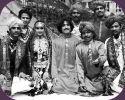


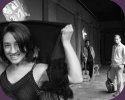


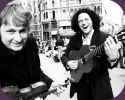
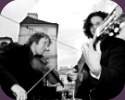
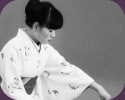
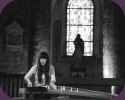
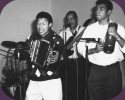
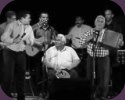
Sound Cosmos World Music 2006
In 2006, the concert series Sound Cosmos World Music enters its fifth year! Again we can look forward to a year
of exciting concert events of music seldom heard, from different parts of Europe, Asia and Latin America:
January 26th
6.00 p.m.
Thomaskirche, Opphoferstraße 60
Dhoad - Gipsy music from Rajastan / India
6.00 p.m.
Thomaskirche, Opphoferstraße 60
Dhoad - Gipsy music from Rajastan / India
The ensemble comes from the north Indian state of Ra-
jastan, home of the legendary Maharajas, but also origin
of the Gipsies and the desert people "Dhoad". This area
is a crossing point of ancient (nomadic) peoples and great world religions. It is rich both in musical and spiritual tra-
ditions, which to the present day are passed on from generation to generation. In Rajastan you find a uniquely spectacular mix of Gipsy, Hindu and Islamic culture. The ensemble "Dhoad" consists of excellent musicians, acro-
bats, a Sapera dancer and a fire-eating fakir. They present traditional music and dance with classical instruments like tabla and dholak (Indian castagnettes), a harmonium and the snake-charming double flute pungi.
February 16th
6.00 p.m.
Hauptkirche Unterbarmen, Martin-Luther-Straße 16
Maria Carvalho & Trio Fado / Portugal
6.00 p.m.
Hauptkirche Unterbarmen, Martin-Luther-Straße 16
Maria Carvalho & Trio Fado / Portugal
Trio Fado presents interpretations of songs by famous composers and singers. A music full of yearning abducts the audience to the picturesque old parts of Lissabon, where melancholy voices lead the way through the nar-
row, colourful alleys. At the beginning of the 19th century, the Fado, a music ranging from sad and melancholy to cheerful, was first heard in the dubious world of the Portu-
gese capital, until students took up the genre and helped it become socially acceptable. Maria Carvalho with her sing-
ing immerses into the profound songs of the Fado, while her soft voice always retains a hint of lightness. António de Brito, singing with a strong and smoky temperament, pre-
sents the male version of the Fado. They are accompanied by Daniel Pircher on the Portugese Guitar and Benjamin Walbrodt on the Cello.
March 23rd
6.00 p.m.
Lutherstift, Schusterstraße 15
Ulla Pirttijävi / Joik songs of the Finnish Sami
6.00 p.m.
Lutherstift, Schusterstraße 15
Ulla Pirttijävi / Joik songs of the Finnish Sami
What exactly is a Joik? The Joik is the traditional Sami song from the time when the Sami still had their own settle-
ments. It is part of their shamanist faith. What is import-
ant: you don't joik about something. You joik the things themselves, so that they become present. You don't just sing some verses about a love story, but you conjur and enact the very sentiment of love. The Joik is not your or-
dinary little song. It is immensely important for the social fabric of the group. When a child is born, the parents create a Joik for their offspring, to help them find their place in the community. It is comparable to giving the child a name. Originally, the Joik was strictly vocal, only for certain ceremonies accompanied by a single drum. From the 1970s and '80s onwards, the young Sami gradually introduced more instruments to it: guitar, bass, percuss-
ions. The point, though, is to conserve the Joik and not subordinate it to the instruments. You have to be free to develop the Joik with your voice, and it takes good music-
ians who are able to follow the vocals.
April 27th
6.00 p.m.
Thomaskirche, Opphoferstraße 60
"Die Strottern" / Wienerlieder and G'stanzln from Austria
6.00 p.m.
Thomaskirche, Opphoferstraße 60
"Die Strottern" / Wienerlieder and G'stanzln from Austria
The origin of the name "Die Strottern" lies in the Old Viennese term "Strotter", meaning "thug, tramp, footpad, casual worker". The dictionary of Viennese dialect also offers this explanation: "Somebody who looks for things
to be utilized", and that is what the Strottern do in the more or less great wealth of Viennese song material. When the Strottern take their audience on a journey into the world of Viennese music, old dances from the 16th century quite casually join hands with songs that have their origins in today's Vienna. From the famous "Kremser Alben", dating as far back as 1536, to Couplets and G'stanzln from the 19th century and on to Hermann Leopoldi ranges the repertoire of select classics. With their own songs and settings of texts by the Viennese poet Peter Ahorner, though, the Strottern are particularly rooted in present-day Vienna. Die Strottern, that is Klemens Lendl and David Müller, have recovered the Wienerlied, neither using nor avoiding, but freeing it by their performance, in the most literal sense of the word and place. Klemens Lendl, with his voice and his violin: that's not fiddling ar-
ound a town in any hypocritically-mawkish-sugary-merry way. Klemens Lendl sings, and his bow declares a sent-
iment of Vienna. Congenial: David Müller, who has a refreshing grip on his guitar.
May 18th
6.00 p.m.
Hauptkirche Unterbarmen, Martin-Luther-Straße 16
Myôka - Etsuko Chida / Courtly music from Japan:
Koto & vocals
6.00 p.m.
Hauptkirche Unterbarmen, Martin-Luther-Straße 16
Myôka - Etsuko Chida / Courtly music from Japan:
Koto & vocals
Myôka is the stage-name of the young singer and koto-
player Etsuko Chida, who was born in Sapporo on Japan's northernmost island, Hokkaido, and presently lives in France. From her early childhood she was introduced to
the high art of playing the koto - the beautiful, more than thousand years old instrument with its rare, elegant sound. The koto belongs to the family of zithers, is about 180 cm long and has 13 equally long and equally strong strings spanned across 13 movable bridges. Originally these strings were made of silk, which meant they lasted for a single concert only. Today more rubust nylon strings are in use, which also produce a stronger sound. Koto is
a highly refined art music that requires high sensitivity and expresses in a clear and unpretentious manner the sound of the soul and the world through powerful inner rever-
berations. In the strict school of Yamada, which ranges among the best schools of Japanese vocal music, Etsuko Chida received her training as a singer with Master Yemoto Hagioka.
June 22nd
6.00 p.m.
Lutherstift, Schusterstraße 15
Kardón Guajiro / Vallenato music from Colombia
6.00 p.m.
Lutherstift, Schusterstraße 15
Kardón Guajiro / Vallenato music from Colombia
Vallenato is the name of a musical style from the Caribbean coast of Colombia - danceable ballads, accompanied on the accordion, which came to Colombia from Germany in the 19th century on different ways. The ballads of Vallenato are images portraying the country's social history. In the mirror of colonial history, they recount in a poetical, humor-
ous, cheerful - sometimes also sad - manner the emotions and thoughts of the simple people from the country and the seacoast. Up to the present day the composers, sing-
ers-poets and accordionists meet for annual competitions and festivals, to perform the latest ballads and determine the best accordionists. The ensemble Kardón Guajiro comes to North Rhine-Westphalia as a classical quartet, consisting of: vocals, accordion, percussions, guitar. The group, founded in the early 1990s with Javier Polo as its leader, has since earned and maintained its place among the best Colombian Vallenato ensembles.
We send all the friends of Sound Cosmos Season's Greetings and the best wishes for 2006!
We look forward to welcoming you to the concerts next year!
Yours, the Sound Cosmos team
Archive
Concept